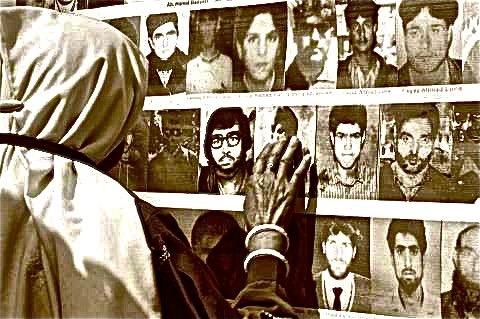
by Leila al-Shami
Today, the British parliament will be voting on whether or not to join the US coalition in bombing Daesh (ISIS). During the debates the British left has outdone itself – even by its own usual standard of idiocy – to the extent it makes the Tories look progressive.
Over the past few days, demonstrations have been held in London and elsewhere to oppose the UK bombing Syria. The demonstrations were organized by the Stop the War Coalition (STW), an organization which has long adopted a counter-revolutionary position on Syria. Since the start of the uprising in 2011 STW has refused to acknowledge the agency of the oppressed Syrian people struggling against a fascist regime or to support their struggle in any form, preferring to see the current conflict only through a geopolitical lens. Their selective anti-imperialism means they’ve only ever opposed Western intervention in Syria (even when this was not a reality) and refuse to actively oppose Russian or Iranian intervention. They have never called for any action against Assad or opposed the war he has waged on the Syrian people, raining down barrel bombs and targeting civilian areas with Scud missiles for over four years. It is this war which has been the main cause of civilian deaths in Syria and which has created the vacuum and desperation giving rise to Daesh. These ‘progressives’ have consistently refused to give a platform to revolutionary Syrians. They have even, shamefully, called the police to remove Syrians present at a recent meeting. Conversely, they give non-Syrian apologists for the Assad regime a voice, people such as the odious George Galloway and massacre-denier Mother Agnes.
At the demonstrations organized by STW some present were holding Baathist flags and pictures of the mass-murderer Assad. Seriously, a blatant fascist presence was considered acceptable at a protest organized by people who describe themselves as leftists. It is no wonder that their demonstrations were small (compared to the heyday of the Iraq war demos), with no large scale Syrian or Muslim presence. I am sure many who oppose the bombing of Syria would feel alienated joining a protest organized by those who ally themselves with a regime that practices torture on an industrial scale, sodomizes its opponents with broken bottles, and gasses civilian neighbourhoods. One of the speakers at the event held last Saturday, Tariq Ali (once considered a ‘radical’, so I’m told) rhetorically called for Britain to ally itself with Assad and Russia if it wanted to defeat Daesh. This was based on his erroneous claim that Russia is actually attacking Daesh, whilst the evidence shows that the majority of Vlad the Invader’s attacks are aimed at anti-Assad forces (which have also been fighting Daesh since January 2014) and civilians in areas with no Daesh presence. As for Assad, not only has he not attacked Daesh until recently (to gain international legitimacy as a partner in the ever expanding War on Terror) but has actively facilitated its growth.
Jeremy Corbyn, the current leader of the British Labour Party who has been the Chair of STW for the past four years and has now appointed the Stalinist and Putin supporter Seumas Milne as the party’s director of communications, is giving his party’s members the choice of whether to back joining the US coalition or not. To help them make up their minds he has invited Patrick Cockburn to brief Labour MPs on Syria ahead of the vote. Patrick Cockburn openly supports the fascist mass murderer Assad, has called for Britain to ally with Assad’s imperialist sponsors Russia and Iran, has consistently slandered Syrian rebels as ‘Al Qaeda’, makes shit up in his writing like pretending to be an eyewitness to massacres which likely never happened, and recommends Donald Trump’s analysis on the Middle East. Does anyone really consider these people progressives? As an anarchist, it seems to me that the statist ideologies of both left or right have much more in common with each other than any values or principles I adhere to.
As a British Syrian who opposes any foreign power bombing Syria, I cannot help but feel disgusted that these people have hijacked the debate. The only way to defeat Daesh is to give support to local forces which are engaged in the battle with them on the ground. This must include Sunni Arab forces – the population Daesh attempts to rule. Cameron was not wrong when he said there are 70,000 moderate opposition fighters in Syria. However, the idea that these forces will join a coalition fighting Daesh which doesn’t address the main threat to Syrians – the Assad regime – is absurd. As for the anti-war left, if they are to have any relevance or moral compass, they must oppose all those who are bombing Syrians, including the Assad regime and its imperial backers, Russia and Iran. Most of all, they must listen to the voices of Syrians instead of sticking to their patronizing and unprincipled stance of inviting ‘experts’ of dubious credentials speak on their behalf.
Regardless of the outcome of today’s vote, the bombs on Syria will continue to fall.

 This piece was published at
This piece was published at  This was published
This was published  This was first published (with some great links)
This was first published (with some great links) 


